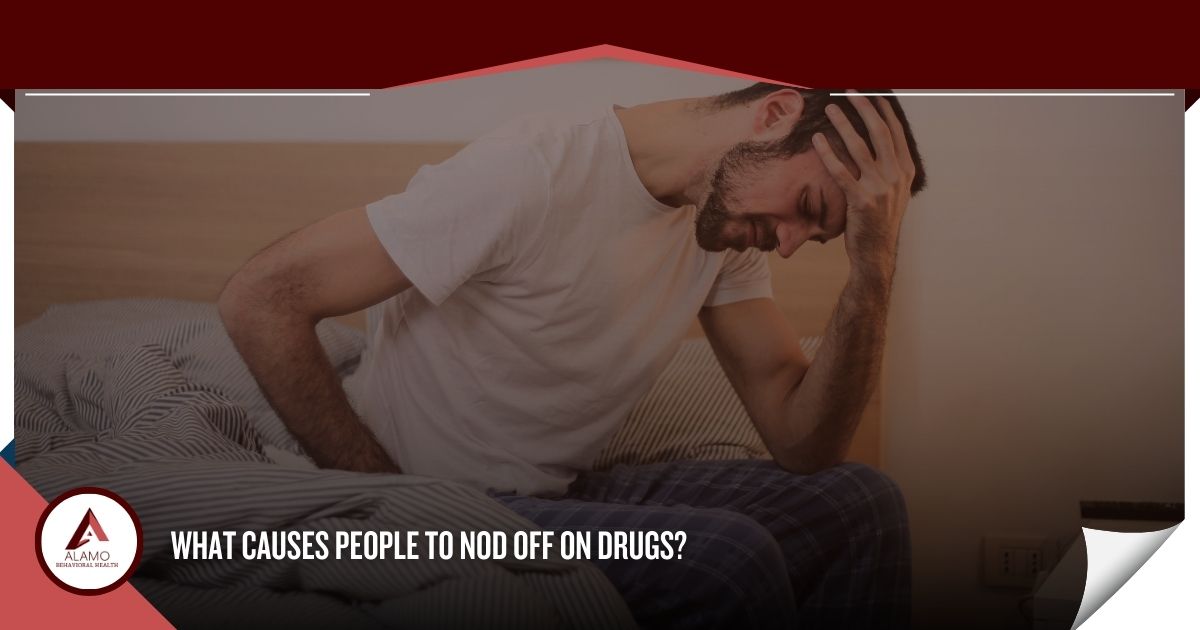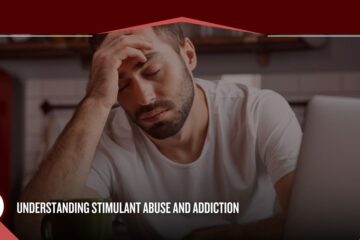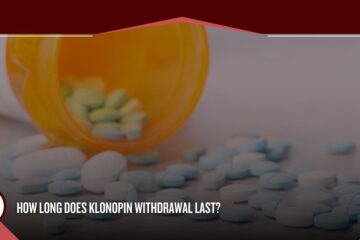Drug abuse can change how a person thinks, feels, and acts. You may notice significant changes in their appearance or see them behave differently. There are often many telltale signs of drug use and addiction to watch for.
Nodding off is one sign of drug use. Some drugs can cause people to lose awareness of consciousness for brief periods. Nodding off (sometimes called “nodding out”) may be a clear sign of drug use.
This article will explore what causes people to nod off on drugs. You will learn:
- What nodding off looks like
- What drugs can cause people to nod off
- How to recognize drug abuse or addiction
- Where to find effective addiction treatment
Drug addiction can impact every aspect of your life. It can harm your health, emotional well-being, and relationships.
If you live with drug addiction, it may feel like you aren’t in control of your life. Comprehensive treatment can help you regain control and live the healthy, sober future you choose.
Reach out to the Alamo Behavioral Health specialists now to explore our holistic treatment programs or to schedule an intake assessment.
What is “Nodding Off?”
Nodding off is a symptom of drug abuse. People may nod off while using drugs that depress central nervous system (CNS) activity.
People may appear as though they are falling asleep. They may experience a brief loss of consciousness before “waking up” again.
People may nod off while talking or standing up. They may stop talking or mumble after they appear to lose consciousness. If you touch or speak to someone who has nodded off, they may regain consciousness but may not be able to stay awake.
Nodding off on drugs is different than simply dozing off because of extreme drowsiness or boredom. It is a sign that someone is using depressant drugs.
What Drugs Cause People to Nod Off?
Sedative drugs can cause people to nod off. Here is an overview of some of the drugs that can cause people to nod off.
Opioids
Abusing opioids has a high risk of harm. Nodding off is one of the side effects of opioid abuse.
Commonly abused opioids include:
- Prescription opioid painkillers like oxycodone, codeine, and morphine
- Illicit opioids like heroin
Opioids bind to receptors in the brain and slow central nervous system (CNS) activity. Users experience a range of sedative effects. Opioid addicts have an increased risk of deadly overdose.
Opioid addiction is a severe and complex problem. People with opioid use disorder require comprehensive treatment options to manage withdrawal symptoms during detox. Holistic treatment and continuing support can help people achieve long-term recovery.
Benzodiazepines
Benzos are a type of sedative drug. People take prescription benzodiazepines to manage the symptoms of several conditions, including:
- Alcohol withdrawal
- Anxiety
- Panic attacks
- Sleep disorders
Some commonly-prescribed benzos include:
- Ativan
- Valium
- Xanax
Benzodiazepines slow CNS activity. People may feel calm or sedated after taking benzos. Benzo misuse can result in people taking larger doses than prescribed. Some users may nod off if they experience excessive drowsiness after taking a large dose of a benzodiazepine drug.
Alcohol
Alcohol slows CNS activity and can cause sedation. People who drink excessively may experience brief losses of consciousness that are similar to nodding off.
Barbiturates
Barbiturate use and abuse are less common than in past decades. However, people who abuse barbiturate drugs may experience sedation that causes them to lose consciousness for short periods.
Drug and alcohol abuse can lead to physical dependence. It is essential to seek treatment as soon as you recognize the signs of addiction.
What are the Dangers of Nodding Off on Drugs?
Drug abuse can be hazardous in many ways. Nodding off can increase the risk of falls, accidents, and other dangers.
People who use opioids may lose consciousness during an overdose. An opioid overdose is a life-threatening emergency. Some signs of an opioid overdose include:
- Cold, pale, or clammy skin on the face and body
- Limp limbs
- Purple or bluish fingernails and lips
- Vomiting
- Gurgling sounds
- Loss of consciousness
- Slow or shallow breathing
- Slow heart rate
If someone near you is nodding off or exhibiting signs of an opioid overdose, call 911 right away. If you have naloxone (Narcan) available, administer it as quickly as possible. Remain with the person until EMS arrives.
Recognizing Addiction
Nodding off can be a sign of opioid or other drug addiction. Addiction is a total loss of control over your substance use. People who live with addiction will continue to use drugs, even when it causes substantial harm.
In addition to nodding out, some signs of addiction include:
- Needing to use more drugs to get the desired effects
- Neglecting hygiene, responsibilities, relationships, and hobbies
- Having new legal or financial trouble
- Spending a lot of time and energy getting, using, and recovering from using drugs
- Having cravings for addictive substances
- Experiencing withdrawal symptoms if you stop using drugs
Recovering from addiction can be challenging, but getting treatment can offer the support you need to succeed. Reach out to the Alamo Behavioral Health specialists now to explore your treatment options or to schedule an intake evaluation.
References:
- National Institute on Drug Abuse (NIDA): Misuse of Prescription Drugs Research Report
- National Institutes of Health (NIH): Importance of the correct diagnosis of opioid-induced respiratory depression in adult cancer patients and titration of naloxone
- National Institutes of Health (NIH): Opioid Overdose
- NIH: Benzodiazepines: Uses, Dangers, and Clinical Considerations





